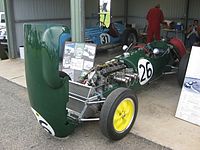Lotus 12
 | |||||||||||
| Category | Formula One, Formula Two | ||||||||||
|---|---|---|---|---|---|---|---|---|---|---|---|
| Constructor | Team Lotus | ||||||||||
| Designer(s) | Colin Chapman | ||||||||||
| Successor | Lotus 16 | ||||||||||
| Technical specifications[1] | |||||||||||
| Chassis | Aluminium body on multi-tubular space frame | ||||||||||
| Suspension (front) | Double wishbone, coils springs, dampers, anti-roll bar | ||||||||||
| Suspension (rear) | Chapman strut, trailing arms, fixed length drive shaft | ||||||||||
| Length | 130.9 in (332.5 cm) | ||||||||||
| Width | 60 in (152.4 cm) | ||||||||||
| Height | 35 in (88.9 cm) | ||||||||||
| Axle track | 48 in (121.9 cm) | ||||||||||
| Wheelbase | 87.9 in (223.3 cm) | ||||||||||
| Engine | Coventry Climax FPF 1,965 cc (119.9 cu in) Inline 4-cylinder, DOHC Naturally-aspirated Front engined, longitudinally-mounted | ||||||||||
| Transmission | Ansdale-Mundy transaxle 5-speed manual ZF diff. with bespoke casing | ||||||||||
| Power | 175 bhp (130.5 kW) | ||||||||||
| Weight | 320 kg (705.5 lb) | ||||||||||
| Fuel | Petrol | ||||||||||
| Brakes | Disc, all-round | ||||||||||
| Tyres | Dunlop | ||||||||||
| Competition history | |||||||||||
| Notable entrants | Team Lotus | ||||||||||
| Notable drivers | |||||||||||
| Debut | 1958 Monaco Grand Prix | ||||||||||
| Last event | 1959 British Grand Prix | ||||||||||
| |||||||||||
| n.b. Unless otherwise stated, all data refer to Formula One World Championship Grands Prix only. | |||||||||||
The Lotus 12 was a British racing car used in Formula Two and Formula One. It debuted at the 1958 Monaco Grand Prix and was Colin Chapman's first single-seat racer.
Design
[edit]Colin Chapman's first foray into single-seater racing, the 12 appeared in 1958. It featured a number of important innovations Chapman would use on later models. To better use the power of the Coventry Climax engine, it was designed, as usual, for low weight and low drag, relying on a space frame. It placed the driver as low as possible, reducing the height of transmission tunnel by way of a "conceptually brilliant"[2] five-speed sequential-shift transaxle located in the back. This transaxle was designed by Richard Ansdale and Harry Mundy. The gearbox had a (long-undiagnosed) oil starvation problem, thus earned the nickname "Queerbox" for its unreliability.
Although the first two examples of Lotus 12 had De Dion rear suspension, it also introduced a new suspension configuration with what came to be called "Chapman struts" in the rear, essentially a MacPherson strut with a fixed length halfshaft with universal joints on the ends utilised as a suspension arm.[3]
Lotus 12 was the first Lotus to be fitted with the iconic wobbly-web wheels.[4] Reflecting Chapman's emphasis on engineering for lightness, these were cast in magnesium alloy, a kind of crimped cylinder, resulting in minimum material and maximum strength, without the weaknesses induced by slots in conventional designs.[2]
Despite its engineering advances, the 12 was not a success in F1. In F2, the car won the class in the mixed F1/F2 1958 BRDC International Trophy, driven by Cliff Allison, but in spite of a small number of podiums, was usually drowned in a sea of Coopers.
Gallery
[edit]-
Lotus 12 in the Donington Grand Prix Exhibition in 2007
-
Lotus 12, Chassis No. 353 in 2010
-
Lotus 12, Chassis No. 353 in 2013
Complete Formula One World Championship results
[edit](key) (Results in bold indicate pole position; results in italics indicate fastest lap.)
| Year | Teams | Engine | Tyres | Drivers | 1 | 2 | 3 | 4 | 5 | 6 | 7 | 8 | 9 | 10 | 11 | Points | WCC |
|---|---|---|---|---|---|---|---|---|---|---|---|---|---|---|---|---|---|
| 1958 | Team Lotus | Climax Straight-4 | D | ARG | MON | NED | 500 | BEL | FRA | GBR | GER | POR | ITA | MOR | 3 | 6th | |
| Cliff Allison | 6 | 6 | 4 | Ret | 10 | 7 | 10 | ||||||||||
| Graham Hill | Ret | Ret | Ret | ||||||||||||||
| Ecurie Demi Litre | D | Ivor Bueb | 11* | ||||||||||||||
| 1959 | Dennis Taylor | Climax Straight-4 | D | MON | 500 | NED | FRA | GBR | GER | POR | ITA | USA | 5 | 4th1 | |||
| Dennis Taylor | DNQ |
^1 All points scored using the Lotus 16. * F2 driver
Notes
[edit]- ^ "Ultimate Car Page Lotus 12". Retrieved 15 July 2023.
- ^ a b Setright, p. 1225
- ^ Setright, pp. 1225–6
- ^ Ludvigsen, Karl (2010). Colin Chapman: Inside the Innovator. Haynes Publishing. pp. 119–121. ISBN 978-1-84425-413-2.
Sources
[edit]- Setright, L. J. K. Lotus: The golden mean, in Northey, Tom (ed.) World of Automobiles (London: Orbis, 1974), Volume 11, pp. 1221–34.




